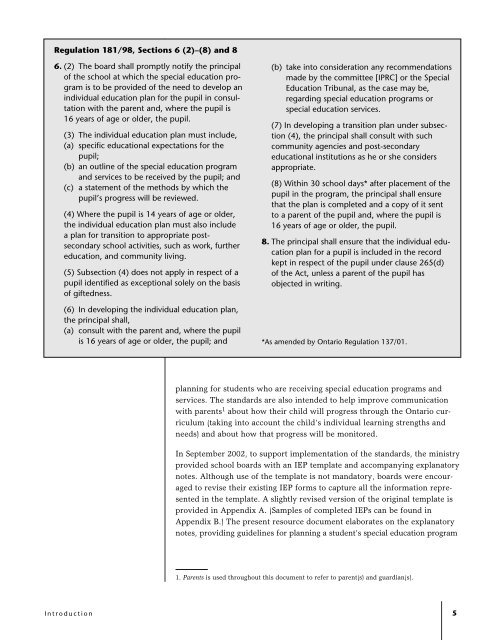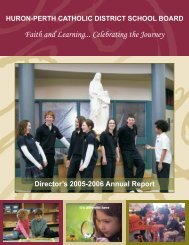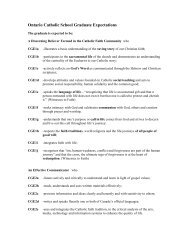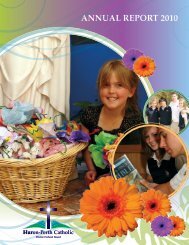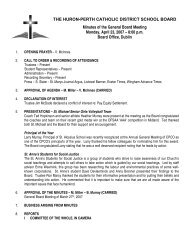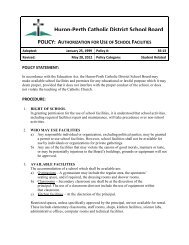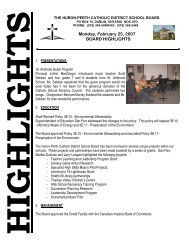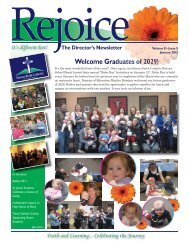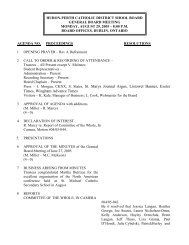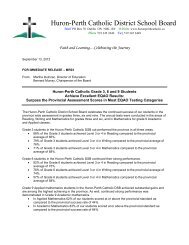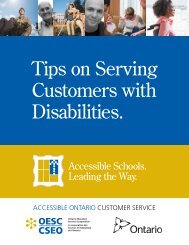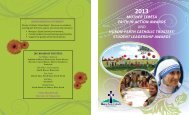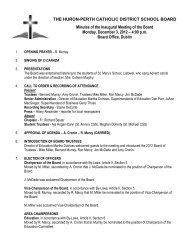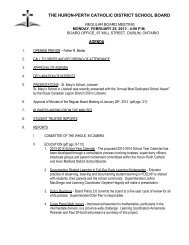The Individual Education Plan (IEP) - A Resource Guide, 2004
The Individual Education Plan (IEP) - A Resource Guide, 2004
The Individual Education Plan (IEP) - A Resource Guide, 2004
You also want an ePaper? Increase the reach of your titles
YUMPU automatically turns print PDFs into web optimized ePapers that Google loves.
Regulation 181/98, Sections 6 (2)–(8) and 8<br />
6. (2) <strong>The</strong> board shall promptly notify the principal<br />
of the school at which the special education program<br />
is to be provided of the need to develop an<br />
individual education plan for the pupil in consultation<br />
with the parent and, where the pupil is<br />
16 years of age or older, the pupil.<br />
(3) <strong>The</strong> individual education plan must include,<br />
(a) specific educational expectations for the<br />
pupil;<br />
(b) an outline of the special education program<br />
and services to be received by the pupil; and<br />
(c) a statement of the methods by which the<br />
pupil’s progress will be reviewed.<br />
(4) Where the pupil is 14 years of age or older,<br />
the individual education plan must also include<br />
a plan for transition to appropriate postsecondary<br />
school activities, such as work, further<br />
education, and community living.<br />
(5) Subsection (4) does not apply in respect of a<br />
pupil identified as exceptional solely on the basis<br />
of giftedness.<br />
(6) In developing the individual education plan,<br />
the principal shall,<br />
(a) consult with the parent and, where the pupil<br />
is 16 years of age or older, the pupil; and<br />
(b) take into consideration any recommendations<br />
made by the committee [IPRC] or the Special<br />
<strong>Education</strong> Tribunal, as the case may be,<br />
regarding special education programs or<br />
special education services.<br />
(7) In developing a transition plan under subsection<br />
(4), the principal shall consult with such<br />
community agencies and post-secondary<br />
educational institutions as he or she considers<br />
appropriate.<br />
(8) Within 30 school days* after placement of the<br />
pupil in the program, the principal shall ensure<br />
that the plan is completed and a copy of it sent<br />
to a parent of the pupil and, where the pupil is<br />
16 years of age or older, the pupil.<br />
8. <strong>The</strong> principal shall ensure that the individual education<br />
plan for a pupil is included in the record<br />
kept in respect of the pupil under clause 265(d)<br />
of the Act, unless a parent of the pupil has<br />
objected in writing.<br />
*As amended by Ontario Regulation 137/01.<br />
planning for students who are receiving special education programs and<br />
services. <strong>The</strong> standards are also intended to help improve communication<br />
with parents 1 about how their child will progress through the Ontario curriculum<br />
(taking into account the child’s individual learning strengths and<br />
needs) and about how that progress will be monitored.<br />
In September 2002, to support implementation of the standards, the ministry<br />
provided school boards with an <strong>IEP</strong> template and accompanying explanatory<br />
notes. Although use of the template is not mandatory, boards were encouraged<br />
to revise their existing <strong>IEP</strong> forms to capture all the information represented<br />
in the template. A slightly revised version of the original template is<br />
provided in Appendix A. (Samples of completed <strong>IEP</strong>s can be found in<br />
Appendix B.) <strong>The</strong> present resource document elaborates on the explanatory<br />
notes, providing guidelines for planning a student’s special education program<br />
1. Parents is used throughout this document to refer to parent(s) and guardian(s).<br />
Introduction<br />
5


